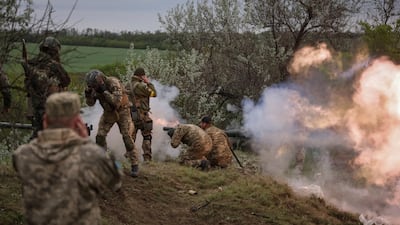Belarus is sending troops to the border with Ukraine in a bid to distract Kyiv from the battle for the Donbas, British intelligence suggests.
Special forces from President Alexander Lukashenko’s army are massing on the 1,084-kilometre southern boundary with Ukraine, while other factions are being posted to the West, towards the border with Poland.
Soldiers from Belarus have not been directly involved in Russia’s war in Ukraine, now in its 12th week, but the Kremlin used its allied country’s territory as a launch pad for its invasion in February.
As the Russians encounter stiff resistance from the Ukrainians in the Donbas, President Vladimir Putin’s bid to dominate the eastern Ukrainian region appears to have stalled a month after the offensive began.
In an intelligence update issued on Monday, the UK’s Ministry of Defence said Belarus appeared to be engaging in distraction tactics by massing troops on the border with Ukraine in a bid to take Kyiv’s eyes off the region.
“Following exercise activity earlier this month, Belarus has announced the deployment of special operations forces along the Ukraine border, as well as air defence, artillery and missile units to training ranges in the west of the country,” the MoD update said.
“The presence of Belarusian forces near the border will likely fix Ukrainian troops, so they cannot deploy in support of operations in the Donbas.
“Despite early speculation, to date Belarusian forces have not been directly involved in the conflict. However, Belarusian territory was used as a staging post for Russia’s initial advance on Kyiv and Chernihiv. Russia has also launched air sorties and missile strikes from Belarus.”
The MoD said Mr Lukashenko, a key ally of Mr Putin, appeared to be “balancing support for Russia’s invasion with a desire to avoid direct military participation with the risk of western sanctions”. Intelligence also suggested he was likely to be trying to avoid possible retaliation from Ukraine and “dissatisfaction in the Belarusian military”.
Kyiv on Monday was bracing for a new Russian push in the Donbas as the defending forces’ counterattack around Kharkiv gained momentum. After failing to capture the capital city in the first weeks of the war, Mr Putin redirected troops to the Donbas in a battle considered decisive in the invasion.
But western intelligence issued in recent days suggests Moscow’s bid to gain control of Ukraine’s coal mining heartland is stalling as its army suffers heavy losses.
"We are preparing for new attempts by Russia to attack in Donbas, to somehow intensify its movement in the south of Ukraine," Ukrainian President Volodymyr Zelenskyy said in his nightly televised address.
"The occupiers still do not want to admit that they are in a dead-end and their so-called 'special operation' has already gone bankrupt."
Presidential adviser Oleksiy Arestovich told local television that Russian troops were being transferred in the direction of Donbas after withdrawing from Kharkiv after the Ukrainian counteroffensive.
Kyiv's troops have made so much progress in the northern region that they have almost reached the border with Russia, Interior Ministry adviser Vadim Denisenko said.
The Ukrainian army said on Monday that some Russian forces remained to try to block the advance and air sirens sounded in Kharkiv city in the early hours.
The Institute for the Study of War, a US-based think tank, on Saturday said Moscow appeared to be pulling back its forces from Kharkiv. Ukraine’s second-largest city, which lies only 50 kilometres from the Russia border, has been under enemy bombardment since the war began in February.
Gen Sir Richard Barrons, a former British Army officer who served as commander of joint forces from 2013 to 2016, said the development could be taken as a Russian defeat.
“It was just way too big an objective for the Russian military to take and when they got stuck around the outskirts of it they became an easier target for very aggressive Ukrainian counterattack,” he told BBC Radio 4’s Today programme.
Gen Barrons said Russia’s retreat from Kharkiv proved its army “doesn’t have the numbers or perhaps the will or the skill to take large cities”.
But he said the foiled attempt to control Kharkiv should not be perceived as an overall failure of Russia’s invasion of Ukraine on its terms.

















































